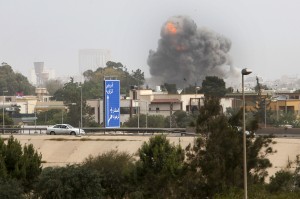Libyans chafe under Gadhafi’s rule in Tripoli

In a June 7, 2011 file photo, a smoke and dust cloud from an explosion rises into the sky after a NATO airstrike in Tripoli, Libya. Anti-Gadhafi activists say they are emboldened by NATO strikes pounding the capital for the past two months in support of the insurgency. (AP Photo/Abdel Meguid al-Fergany, File)
TRIPOLI, Libya—The men labored in a sandy alley in the Libyan capital, trying to weld a rocket launcher to a jeep and brazenly talking about their goal: to battle Moammar Gadhafi’s soldiers in the heart of his regime’s stronghold.
“We want to use it for the battle,” said one man, in his mid-20s and wearing tattered clothing as he measured sheets of metal. “This is an oppressive regime that is built on fear. It has to go.”
Men like these are part of a loose band of activists emboldened by NATO airstrikes to take a stand in Tripoli, where repression of the opposition has been among the harshest in Libya.
Such low-level guerrilla warfare, along with small anti-government demonstrations, are part of a renewed push to shake the Gadhafi regime in its heartland despite a violent crackdown on dissent in the early weeks of the uprising that began Feb. 17.
Anti-Gadhafi activists say they are encouraged by the NATO strikes that have pounded the capital for the past two months in support of the insurgency. They cite gains made by other Libyan rebels, who pushed out Gadhafi forces from a series of mountain towns in the country’s west in late May, and who appear to be slowly gaining ground outside their stronghold in the port city of Misrata, about 125 miles (200 kilometers) from Tripoli.
Article continues after this advertisementThe numbers of anti-Gadhafi activists and their supporters are hard to gauge. Reporters are tightly controlled, and interviews must be done on the sly in quick snatches of conversation. All of the opposition activists who spoke to The Associated Press refused to be identified by name, fearing punishment by government officials.
Article continues after this advertisementFor these activists, the only option is to take up arms against Gadhafi’s forces.
“The time of protests is over. They shoot at the protesters,” one man declared, speaking in the working-class neighborhood of Fashloom, which has become a center of resistance. He described a series of recent armed attacks against Gadhafi forces.
“It’s only in this way that we will be rid of this regime,” he said.
Still, Tripoli is unlikely to fall from within. Opposition, while active, is limited and vastly outgunned. Few of the rebel attacks appear to have been effective.
But resistance in the capital puts additional strain on Gadhafi, whose hold on power has been shaken by the 4-month-old rebel insurgency, 2½ months of NATO airstrikes and a naval blockade. Fuel, medicine and gasoline are scarce. Defections from the military and government have eaten away at the dictator’s power base.
Gadhafi has much genuine support in Tripoli and elsewhere. An English-language teacher in a grocery shop accused Western journalists of underreporting the extent of NATO strikes. Another woman invited reporters to a lecture on Gadhafi’s system of democracy and human rights, insisting there was freedom in her country. African workers in a Tripoli slum said Gadhafi’s regime had given them jobs and stability.
Mixed among them were the angry opponents of Gadhafi’s more than 40-year rule.
Soon after NATO conducted a sudden heavy bombing raid on Tripoli in late May, one medic in an upscale clinic described the rocking explosions as “good.”
He said he hoped the strikes would urge rebels to march on Tripoli. He said his colleagues were sneaking medicine to rebels in the western mountain range, close to the Tunisian border.
His claims could not be verified, but the man appeared to take enormous risk to speak to reporters.
Five residents, interviewed separately, described several daring assaults against Gadhafi forces in late May and early June. The incidents were also reported by a prominent anti-Gadhafi activist.
They included what appeared to be an armed attack by rebels on an army base in Tripoli in late May.
A video uploaded to YouTube by an anti-regime activist purports to show the aftermath: Four badly wounded men who appeared to be rebels lay in pools of blood inside and outside a two-story house. At least one was dead.
Suggesting the fallen men had been involved in a violent attack on soldiers, a man, presumably a soldier, could be heard shouting: “They killed our people at dawn and we took our revenge by the morning. Rats! Dogs!”
A funeral procession on May 30 for one man killed in the attack turned into a demonstration by hundreds of residents in the neighborhood of Souk el-Juma, two residents said. A video of the anti-government protest was uploaded to YouTube.
“There is only one God, and Gadhafi is his enemy!” protesters shouted as they carried a man’s body through the streets.
Days later, residents said an elderly man was killed by soldiers at a gas station in the middle-class neighborhood of Ben Ashour on June 2.
They said the man was killed by jittery soldiers who opened fire at residents fighting over places in a miles-long line for gasoline. A demonstration of several dozen people erupted after the shooting.
“It’s not easy to see somebody fall like that, especially an old man,” said a trader in Ben Ashour, who said he helps run a network of activists organizing peaceful protests.